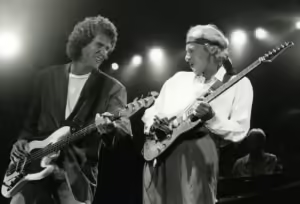
Mark Knopfler, the iconic guitarist and founding member of Dire Straits, has always been more than a rock star. As he prepares to release One Deep River, his tenth solo album, Knopfler is once again showcasing his soulful, virtuosic talents. His evolution from stadium-filling legend to contemplative solo artist is a journey he seems content with—one shaped by years of introspection and musical exploration.
Knopfler was at the helm of Dire Straits during their rise to fame in the 1980s, a time when the band produced hits like “Money for Nothing” and “Romeo and Juliet.” For Knopfler, those years were exhilarating, yet by the late ’80s, he began to question the price of rock stardom. “It suits some people,” he says of the fame. “You can get used to the scale of it. I don’t know if I ever really did.”
As *Brothers in Arms* became a global success in 1985, Knopfler found himself playing 248 shows in a single year—a whirlwind that left little time for anything else. For him, playing to such massive crowds began to feel like losing a part of himself. “If you’re playing events all the time, some great blown-up festival, some great inflated thing, then you are losing something as well,” Knopfler explains. Looking back, he sometimes wonders if he should have pushed the band further, letting it become “as big as Brazil.” However, he quickly reminds himself of the toll that lifestyle took, and why he stepped back when he did.
In 1995, Dire Straits finally called it quits for good, allowing Knopfler to shift his focus entirely to solo projects. And he hasn’t looked back. His latest album, *One Deep River*, is a reflection of his life and influences. “There’s always going to be some autobiography there. Maybe there’s a bit more than usual,” Knopfler says. Songs like “Watch Me Gone” are steeped in his personal history, particularly his early days in Blyth, a coastal town near Newcastle, and his journey to London in pursuit of his dreams.

“Watch Me Gone” captures Knopfler’s inner conflict as a young man torn between his familiar surroundings and the lure of the big city. “The cover [of the album] – that’s me crossing [Newcastle’s iconic Tyne Bridge] and leaving, me going down to London,” he reflects. “You’ve got to be ready to leave and fall in love with the big city.”
This spirit of exploration also defines Knopfler’s musical influences. Folk music and Irish culture have played a major role in shaping his sound. He recalls reading James Joyce as a teenager and later crossing paths with the poet Seamus Heaney. His love for Irish music and storytelling was evident in his score for *Cal*, a 1984 drama that resonated with Knopfler’s fascination with Ireland. “Irish literature meant a lot to me as I was growing up,” he says. “Finnegans Wake, Ulysses, all of those books… Irish writing has been a fantastic gift to the world.”
Alongside folk and Irish music, blues has been a constant in Knopfler’s life. “I was completely on a blues trip,” he says, recounting his admiration for Rory Gallagher, the legendary Irish guitarist. Knopfler recalls seeing Gallagher perform before Dire Straits had formed, and feeling a kinship with his raw, bluesy style. “I was so totally into the blues anyway,” Knopfler remembers, and credits that influence for much of his early musical foundation.
Knopfler’s solo career has allowed him to collaborate with a who’s who of music legends, from Eric Clapton to Bob Dylan, with whom he worked on the 1983 album *Infidels*. Rather than being intimidated by these icons, Knopfler felt a mutual respect. “Bob had a lovely regard for me and I for him,” he says. His connection with Dylan and other musicians has led to unique projects, such as the recent rerecording of his track “Going Home” for the Teenage Cancer Trust. For the project, Knopfler assembled an all-star lineup, featuring the late Jeff Beck, Bruce Springsteen, and even Ringo Starr and his son Zak on drums. The track was recorded just before Beck passed away, adding an emotional layer to the already powerful ensemble performance.
The journey from his early days in Dire Straits to his current solo career has been marked by a desire for authenticity. Knopfler’s songs often emerge from life’s unglamorous moments, a quality that made tracks like “Sultans of Swing” resonate with fans worldwide. “Sultans of Swing was one of those songs where he says, ‘Thank you, good night, we are the Sultans of Swing.’ And when he says that, they couldn’t have been less the sultans of anything,” Knopfler laughs, recalling the inspiration for the song. “There was nothing ‘Sultans of Swing’ about them or the pub either. It’s funny. It was so nonglamorous—and the name is so glamorous.”
That contrast between glamor and grit is also at the heart of “Money for Nothing,” a song inspired by the frustrated rants of a TV salesman. “The lead character in Money for Nothing is a guy who works in the hardware department in a television, custom kitchen, refrigerator and microwave appliance store,” Knopfler recalls. The song, with its biting social commentary, struck a chord in the 1980s and remains one of Dire Straits’ biggest hits. “I’ve got great fondness for it because I’ve got a great fondness for that bozo character,” Knopfler says, referring to the ranting TV salesman. “So I kind of love him. ’Cos he was hilarious. I was laughing as I was writing it down.”
As he reflects on his career, Knopfler expresses pride in his accomplishments with Dire Straits and gratitude for the support of his fans. Even after the band’s dissolution, he remained dedicated to performing their classic songs whenever he took the stage. “If we’ve got to play Brothers and Arms or something, it’s a big moment. You are reminded why people are there,” he says. “You owe it to people. It’s the sort of song where you feel you can’t brush it off to one side. You’ve got to believe it and play it.”
Though he retired from touring in 2019, Knopfler’s commitment to his craft continues. *One Deep River* is both a tribute to his past and a testament to his enduring passion for music. Each note reflects the wisdom of a man who has lived every side of the music industry, from the frenzied highs of stadium tours to the quiet satisfaction of a solo career. His journey has been one of relentless authenticity, a quality that resonates in every chord he plays and every lyric he pens.
In the end, Mark Knopfler’s story is not just one of rock stardom or musical success. It’s a testament to the power of staying true to oneself, of embracing life’s journey with humility and grace. Whether through Dire Straits or his solo work, Knopfler has crafted a legacy that transcends fame—a legacy built on the quiet strength of a man who simply loves to make music.
Leave a Reply